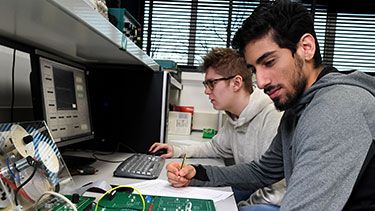
Engineering
Course Overview
The Engineering School offers foundation courses leading to degrees in four major subject areas including Design, Civil Engineering, Electronic and Computer Engineering and Mechanical Engineering.
All courses are designed to produce highly qualified graduates who will take up demanding roles within the engineering, design and technology industries by developing leadership, innovation and creative skills, in addition to the core technical and analytical skills, to enable and encourage graduates to follow successful careers and aspire to senior managerial roles.
Duration
- 2 semesters
Intakes
- September
- January
Location
- Uxbridge, London
Course Details
Foundation Modules
- Engineering Concepts
- ICT and Programming Techniques
- Interactive Learning Skills and Communication for Engineers
- Mathematics for Engineers 1
- Mathematics for Engineers 2
- Physics for Engineers 1
- Physics for Engineers 2
- Problem solving, Creative Thinking and Analytical Skills
Degrees Available
After successfully completing the Brunel Pathway College course you can progress directly into your chosen degree at Brunel University London.
- Aerospace Engineering BEng
- Automotive Engineering BEng
- Chemical Engineering BEng
- Civil Engineering BEng (Hons)
- Civil Engineering (Environmental Engineering) BEng
- Civil Engineering (Flood and Coastal Engineering) BEng
- Computer Systems Engineering BEng (Hons)
- Electronic and Electrical Engineering BEng
- Electronic and Electrical Engineering (Artificial Intelligence) BEng
- Electronic and Electrical Engineering (Communication Systems) BEng
- Electronic and Electrical Engineering (Computer Systems) BEng
- Electronic and Electrical Engineering (Energy Systems) BEng
- Mechanical Engineering BEng (Hons)
Careers
- Aviation
- Building services
- Energy and environmental engineering
- Mining and mineral processing
- Nuclear power
Fees
Find out more about our fees for EU and UK, and International students alongside what scholarships are available.
